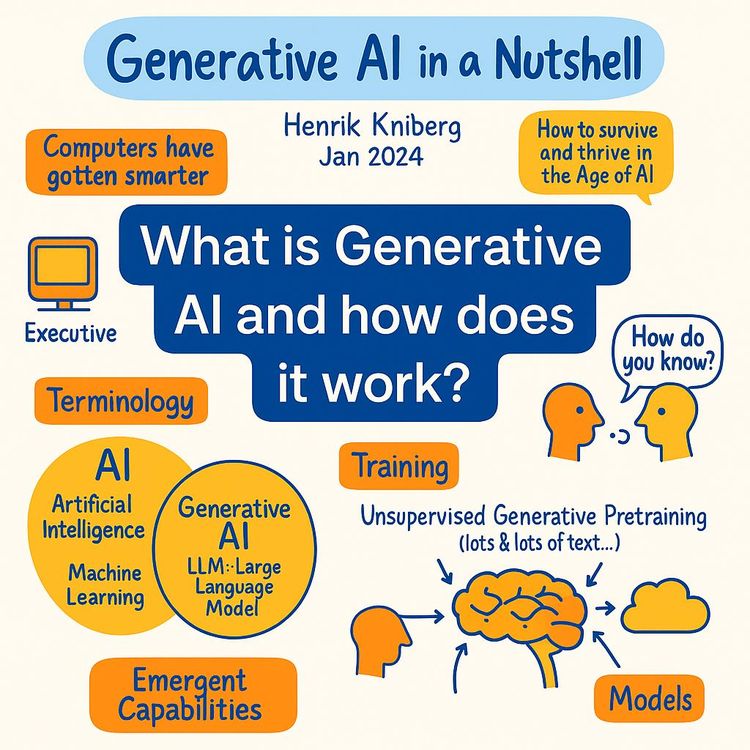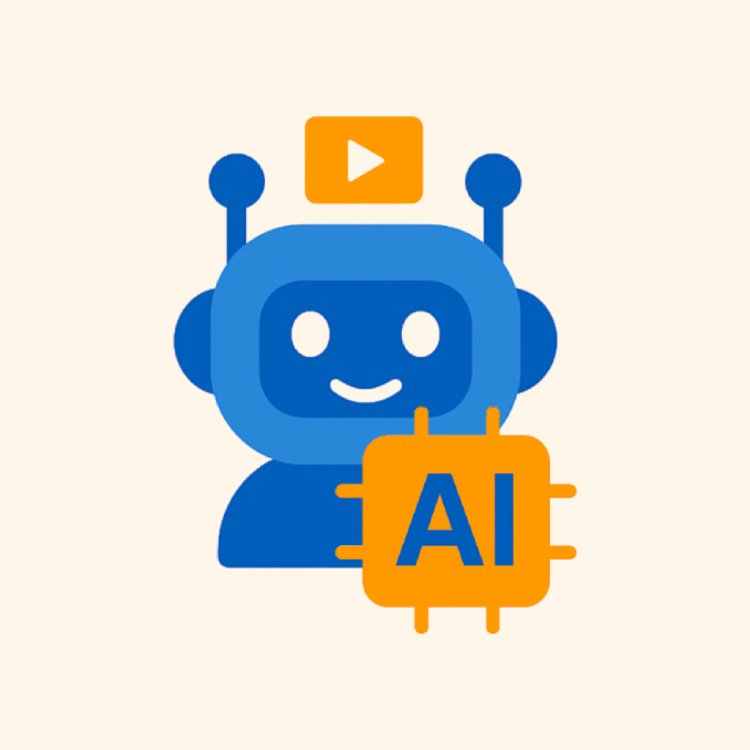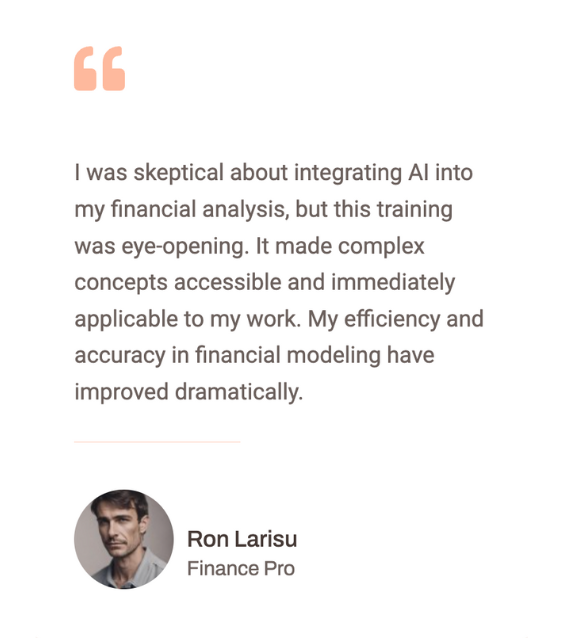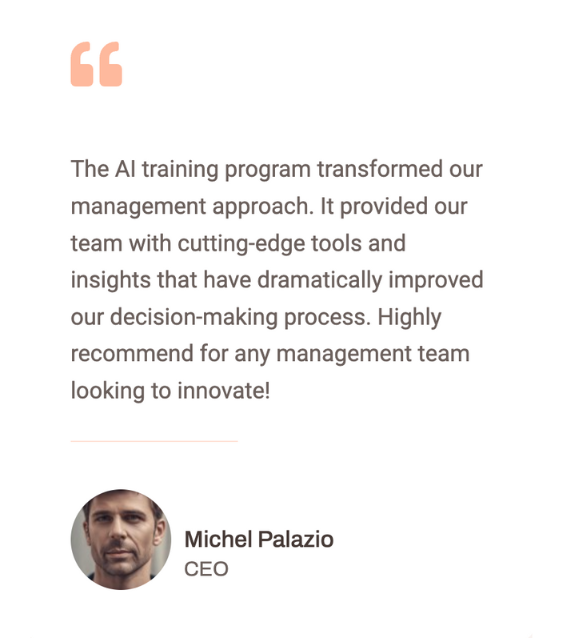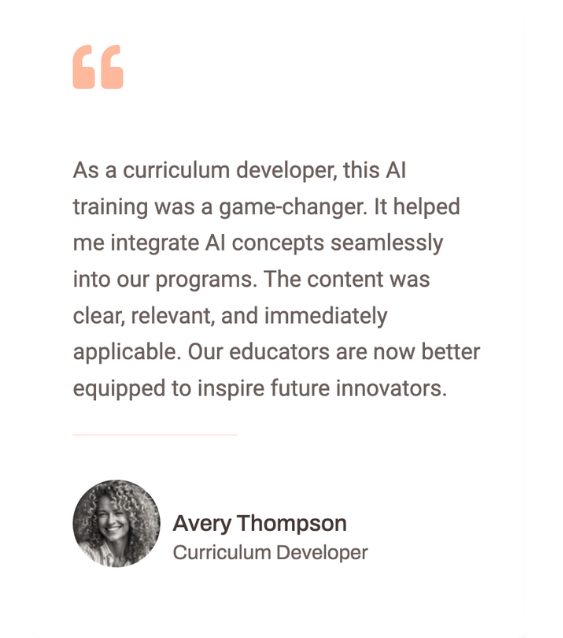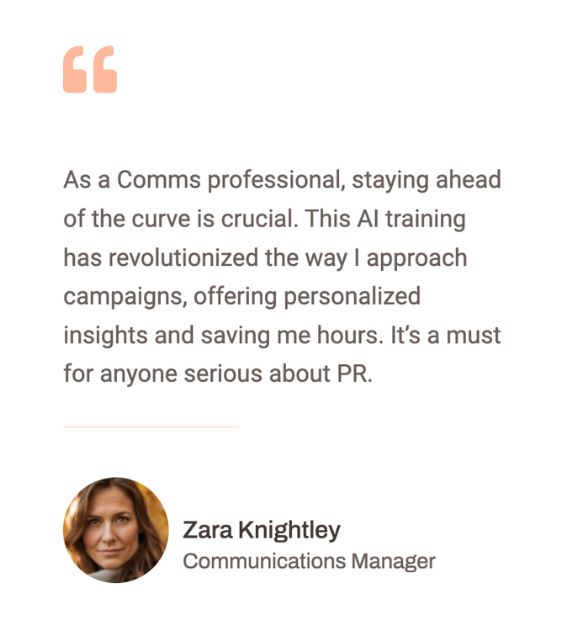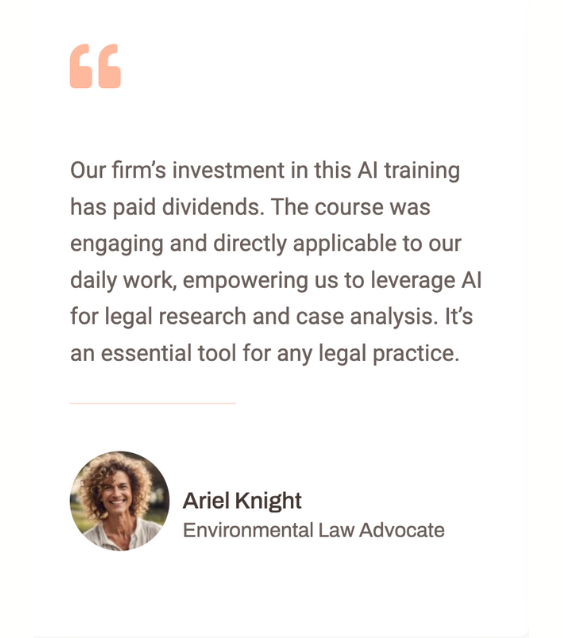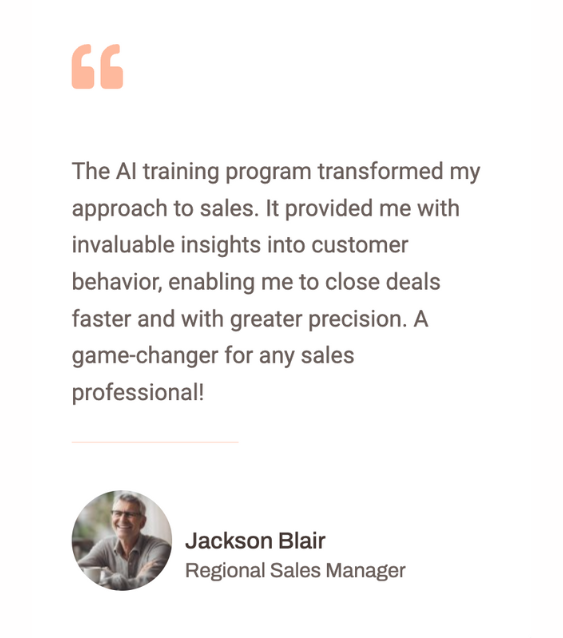Video Course: Part 7 - Role of AI in Performance Management
Discover how AI is revolutionizing performance management, offering tools for real-time insights and unbiased evaluations. Elevate your understanding and drive continuous improvement in your organization.
Related Certification: Certification: Leveraging AI for Effective Performance Management
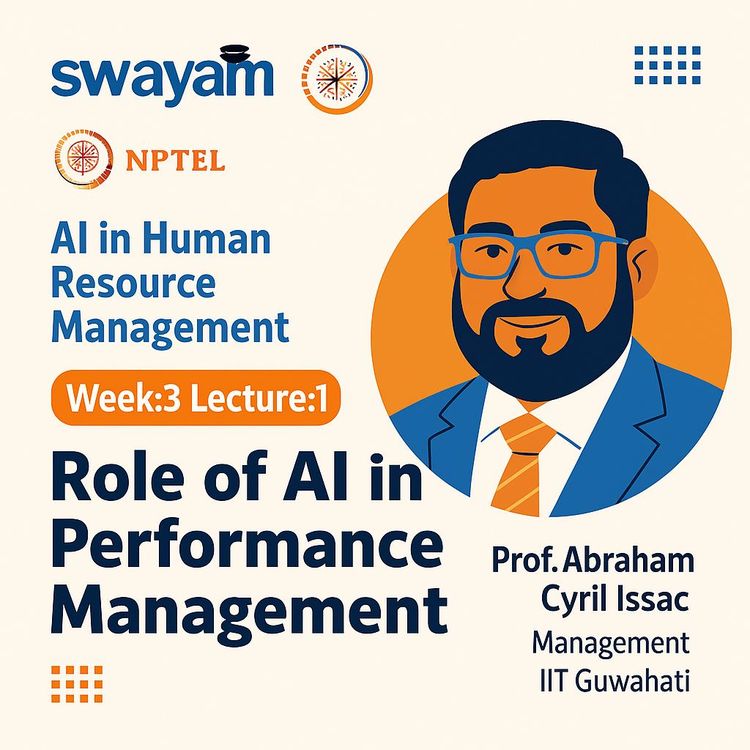
Also includes Access to All:
What You Will Learn
- Explain how AI transforms performance management
- Identify AI tools like goal-setting, 360°, analytics, and chatbots
- Use AI-driven techniques to set and track SMART goals
- Assess ethical, transparency, and bias risks in AI systems
Study Guide
Introduction
Welcome to the comprehensive guide on the Role of AI in Performance Management. This course is designed to help you understand how artificial intelligence is revolutionizing the way organizations manage and enhance employee performance. By diving deep into each concept, you'll gain insights into the benefits, tools, and future trends of AI in performance management. This knowledge is invaluable for anyone looking to leverage AI to streamline processes, reduce biases, and foster a culture of continuous improvement and accountability.
Fundamentals of Performance Management
Performance management is a cornerstone of effective human resource management. At its core, it is a continuous process of setting goals, assessing progress, and providing ongoing coaching and feedback. The rationale behind performance management is simple: what cannot be measured cannot be improved. This process ensures that individual goals are aligned with organizational objectives, fostering a culture of accountability and growth.
For instance, a company might set clear expectations for a sales team to achieve a certain revenue target by the end of the quarter. Regular performance evaluations and feedback sessions help guide employees toward achieving these goals, enhancing their skills and employability. This approach not only promotes individual growth but also contributes to the organization's overall success.
The Need for AI in Performance Management
Traditional performance management methods can be cumbersome and time-consuming. Many organizations struggle to fully utilize comprehensive feedback systems like 360° feedback due to the resources required. Here, AI steps in as a game-changer, offering the ability to perform tasks quicker in real-time and more individualized. AI emphasizes future performance rather than dwelling on past assessments, providing more objective and versatile measurements.
Consider a scenario where AI tools automate the collection and analysis of employee performance data. This allows managers to focus on strategic decision-making rather than administrative tasks, ultimately leading to more personalized and timely feedback for employees.
Defining Artificial Intelligence
Artificial Intelligence (AI) is defined as a computer system that can interact with its surroundings and make choices that help it accomplish its objectives. The core capabilities of AI include:
- Language Processing: The ability to understand and communicate in human language. For example, AI chatbots can interact with employees to gather feedback or provide support.
- Knowledge Representation: The ability to store what the system knows or picks up. This capability allows AI to maintain a comprehensive database of employee performance metrics.
- Automated Reasoning: The ability to use stored information to solve problems and answer questions. AI can analyze performance data to identify trends and suggest improvements.
- Machine Learning: The ability to adapt to changing circumstances and identify patterns in stored data. For instance, AI can learn from past performance reviews to predict future outcomes.
AI Tools in Performance Management
AI-powered tools are transforming performance management by simplifying and enhancing various processes:
- Goal Setting Software: These tools help set clear, achievable, SMART goals and track progress. For example, an AI-driven platform can automatically adjust goals based on real-time performance data, ensuring alignment with organizational objectives.
- Performance Appraisal Software: Streamlines evaluations, records feedback, and monitors employee growth. An example would be software that provides managers with data-driven insights to support their evaluations.
- 360° Feedback Tools: Gather feedback from multiple sources for a comprehensive understanding of performance. AI can analyze this feedback to highlight key areas for improvement.
- Performance Analytics Dashboards: Tools like Power BI or Google Data Studio offer up-to-date performance information, helping identify strengths and areas for improvement.
- Performance Management Apps: Provide easy access to feedback, progress monitoring, and goal management tools in real-time, facilitating continuous performance improvement.
Main Role of AI in Performance Management
AI plays a pivotal role in enhancing performance management through several key functions:
- No Human Error (Reduced Bias): AI systems are data-driven and free from personal biases, allowing managers to deliver impartial feedback. For example, AI can ensure that evaluations are based on objective data rather than subjective opinions.
- Projections Based on Comprehensive Data: AI analyzes extensive data to generate projections for future career growth. This helps managers set suitable goals and make informed promotion decisions.
- Continuous Assessment and Real-Time Analysis: AI enables continuous data collection, providing real-time insights for quicker decision-making and immediate feedback.
- Better Managers: AI assists managers by validating their judgments and ensuring feedback accuracy, offering access to a broader range of data and insights.
- Employee Engagement: AI conducts regular intelligence surveys and collects real-time feedback, providing personalized insights to employees based on survey data or self-assessments.
- Training and Development: AI identifies talent gaps and provides personalized training recommendations based on past performance, career progress, interests, and skill sets.
HR Technologies and AI in Performance Management
The convergence of HR technologies and AI has led to groundbreaking advancements in employee evaluations. AI-powered tools provide HR professionals with Advanced Data analysis reporting and decision-making capabilities, enhancing the effectiveness and efficiency of performance management.
For example, predictive analytics can forecast future performance trends and highlight improvement areas proactively. AI improves the accuracy and objectivity of evaluations by uncovering patterns and correlations. AI-powered chatbots and virtual assistants enhance communication and feedback by providing immediate access to performance-related information and support.
Performance Management Under AI Influence
AI significantly simplifies the process of gathering performance data, especially for employees working across multiple teams. Enhanced by AI, EHRM systems provide a recording mechanism for performance management activities, enabling more impactful coaching conversations.
For instance, real-time data collection from recent events makes information more reliable, supporting continuous, real-time feedback and development discussions. AI improves data quality and efficiency, shifting from backward-looking evaluations to forward-looking performance management.
Strengths of AI Usage in Performance Management
AI offers several strengths in performance management:
- Cost and Time Efficient: AI can replace mundane and repetitive administrative tasks, increasing the ease of documentation, speed, and accessibility to data.
- Data Handling and Processing: AI can analyze large volumes of data quickly, enhancing decision-making speed and improving data quality.
- Unbiased and Errorless Decisions: AI evaluates data objectively, reducing personal biases and human error, potentially leading to lower employee turnover and improved talent retention.
Challenges of AI Usage in Performance Management
Despite its benefits, AI in performance management presents several challenges:
- Lack of Human Touch: AI software lacks the human element necessary for certain decisions and cannot explain its reasoning like humans.
- Lack of Affinity of Communication: Replacing communication with AI can make employees feel undervalued, as AI lacks the personal connection and nuance of human interaction.
- Lack of Transparency: A significant concern is the lack of transparency in algorithmic decision-making, where the reasoning behind AI-driven evaluations may not be clear or easily justifiable.
- Risk of Decontextualization: Data collected solely by AI systems risks focusing on specific factual situations and actions while ignoring the broader context.
Future Landscape of AI in Performance Management
The future of AI in performance management is promising, with several key trends expected to emerge:
- Predictive Performance Analytics: AI will forecast individual employee performance with exceptional precision, allowing for proactive customization of development programs.
- Real-Time Feedback and Personalization: Annual reviews will give way to real-time feedback and on-the-spot suggestions, improving employee experience and promoting ongoing development.
- AI as a Coaching Partner: Advanced AI systems will function as virtual mentors, helping employees navigate personalized development pathways.
- Enhanced Employee Engagement: AI will enable highly responsive performance management systems that detect disengagement early, facilitating prompt actions to re-engage valuable employees.
- Ethical and Fair Appraisal Systems: Greater emphasis will be placed on ensuring AI systems are both effective and ethical, eliminating unconscious biases.
- Workforce Upskilling and Adaptability: AI will be essential in determining future skill needs and supporting workforce upskilling, ensuring employees' skills remain current.
- Integration of AI and Human Insight: The future will see a collaborative synergy where AI offers data-driven insights, while humans contribute context, empathy, and ethical judgment.
Conclusion
In conclusion, the integration of AI in performance management holds immense potential for transforming how organizations evaluate and enhance employee performance. By offering efficiency, objectivity, and data-driven insights, AI can revolutionize performance management practices. However, it is crucial to address the challenges related to the human element, transparency, and ethical considerations. By thoughtfully applying these skills, you can create a more effective, fair, and future-focused performance management system that benefits both employees and organizations alike.
Podcast
There'll soon be a podcast available for this course.
Frequently Asked Questions
Welcome to the FAQ section for 'Video Course: Part 7 - Role of AI in Performance Management'. This resource is designed to address common questions about how AI is transforming performance management in businesses. Whether you're just starting to explore this topic or you're looking for advanced insights, this FAQ aims to provide clear, practical, and comprehensive answers to guide you in integrating AI into your performance management processes effectively.
What is the fundamental aim of Performance Management, and how does AI enhance this process?
Performance Management is a continuous process of setting goals, assessing progress, and providing ongoing coaching and feedback to ensure employees meet their objectives and align with organisational goals. AI enhances this by enabling more objective and versatile measurement of individual performance, moving beyond simple annual appraisals to real-time, data-driven insights. AI tools can automate data collection, analyse large datasets, and provide impartial feedback, reducing human bias and improving the accuracy of evaluations. This allows for a more holistic and future-focused approach to developing employee capacity and aligning individual contributions with strategic intents.
Why is there a growing need for artificial intelligence in Performance Management?
Organisations are increasingly recognising the limitations of traditional Performance Management methods, which can be time-intensive, prone to biases, and often focused on past performance rather than future development. AI offers the potential to address these shortcomings by providing quicker, real-time, and more individualised insights focused on fuelling future performance. The ability of AI systems to process large volumes of data, identify patterns, and offer objective assessments makes it invaluable for reducing the administrative burden of performance reviews, ensuring fairness, and providing timely feedback that supports continuous improvement.
How can AI systems understand and interact within the context of Performance Management?
AI systems relevant to Performance Management require several key capabilities: language processing (to understand and communicate in human language), knowledge representation (to store information), automated reasoning (to use stored information to solve problems), and machine learning (to adapt to changing circumstances and identify patterns in data). These capabilities allow AI to analyse performance-related communication, store employee progress data, provide objective solutions and insights, and adapt its understanding based on new information. This enables a more dynamic and responsive approach to managing and improving employee performance.
What are some specific AI-powered tools currently being used in Performance Management, and what benefits do they offer?
Several AI-powered tools are transforming Performance Management, including:
Goal-setting software: Helps set clear, measurable, achievable, relevant, and time-bound (SMART) goals and track progress, ensuring alignment with organisational objectives.
Performance appraisal software: Streamlines the evaluation process, facilitating feedback recording and monitoring employee growth over time.
360° feedback tools: Gather feedback from multiple sources (co-workers, managers, clients) for a broader understanding of an employee's performance.
Performance analytics dashboards: Offer up-to-date information on individual and team performance, identifying areas of strength and improvement and informing training decisions.
Performance Management apps: Provide easy, anytime access to tools for giving and receiving feedback, monitoring progress, and managing goals in real-time. These tools enhance efficiency, foster better communication, provide data-driven insights, and enable more holistic and timely performance management practices.
What are the key strengths of using AI in Performance Management in terms of objectivity and efficiency?
The main strengths of AI in Performance Management include:
No human error and impartiality: AI is driven by data and is free from personal biases, gathering information from various sources to deliver impartial feedback.
Projections based on comprehensive data: AI analyses extensive data to generate projections of employee performance and career growth, aiding informed decisions on promotions and incentives.
Continuous assessment and real-time analysis: AI enables continuous data collection and provides real-time insights, allowing for quicker decisions and immediate feedback, while also reducing the time spent on periodic reviews.
Creation of better managers: AI assists managers by validating their judgments, ensuring feedback accuracy, and providing broader data and insights about their team members.
Enhanced Employee Engagement: AI can conduct regular intelligent surveys and provide personalised insights, fostering a more engaged workforce.
Targeted training and development: AI can identify talent gaps and recommend personalised training based on performance data, career progress, and skill sets.
Ease of data collection: AI systems simplify the process of gathering performance-related data from various sources, providing a more complete picture of an employee's contributions, especially in cross-functional roles.
Facilitation of e-HRM: AI integration into e-HRM systems provides reliable, real-time data, enabling more impactful coaching and feedback, and supporting a shift towards forward-looking performance development.
Cost and time efficiency: AI can automate administrative tasks, analyse large datasets quickly, and improve the speed and ease of documentation and communication.
Improved data quality: AI enhances the quality of collected data, enabling fact-based performance and development discussions.
Unbiased and errorless decisions: AI evaluates data objectively, reducing personal biases and human error in decision-making, potentially leading to lower employee turnover and improved retention.
What are the main challenges associated with the use of AI in Performance Management that organisations need to be aware of?
Despite its benefits, AI in Performance Management presents several challenges:
Lack of human touch: AI software may lack the empathy and nuanced understanding of human interaction, potentially making employees feel undervalued. It cannot fully capture intangible aspects like genuine ideas or emotions.
Lack of affinity of communication: Replacing human communication with AI can make employees feel disconnected, as AI may not effectively convey understanding or build personal connections.
Lack of transparency: Employees may be cautious about AI in HR due to a lack of transparency in algorithmic decision-making, where the reasoning behind AI-driven evaluations may not be clear or easily justifiable.
Risk of decontextualisation: AI systems may focus on specific data points and actions while ignoring the broader context of an employee's performance and contributions, potentially leading to inaccurate or unfair evaluations.
Potential for manipulation: Employees might try to manipulate AI performance appraisal systems to achieve favourable rankings or provide negative ratings to colleagues unfairly.
How is the integration of AI with HR technologies transforming the assessment and evaluation of employees?
The convergence of AI and HR technologies is fundamentally changing how employee performance is assessed and evaluated. AI-powered tools provide HR professionals with advanced data analysis, reporting, and decision-making capabilities, leading to more effective and efficient performance management. Predictive analytics can forecast future performance trends and identify areas for improvement proactively. AI improves the accuracy and objectivity of evaluations by uncovering patterns and correlations in data. AI-powered chatbots and virtual assistants enhance communication and feedback processes by providing employees with immediate access to performance-related information and support, fostering a culture of ongoing feedback and development. This integration allows organisations to adopt a more flexible and responsive approach to Performance Management.
What does the future landscape of AI in Performance Management look like, and what key trends are expected to emerge?
The future of AI in Performance Management is expected to be transformative, with several key trends emerging:
Elevated predictive performance analytics: AI will forecast individual employee performance with exceptional precision, allowing for proactive customisation of development programs and optimisation of team structures.
Real-time feedback and personalisation: Annual reviews will likely be replaced by continuous, on-the-spot feedback and learning opportunities delivered by advanced AI systems, enhancing employee experience and promoting ongoing development.
AI as a coaching partner: AI systems will function as virtual mentors, guiding employees through personalised development pathways and supporting their career goals with continuous support and guidance.
Enhanced Employee Engagement: AI will analyse patterns in employee interactions to detect disengagement early, facilitating timely interventions to re-engage valuable employees.
Ethical and fair appraisal systems: Greater emphasis will be placed on creating AI systems that eliminate unconscious biases and deliver equitable evaluations for a diverse workforce.
Workforce upskilling and adaptability: AI will be crucial in identifying future skill needs and supporting the upskilling of the workforce, ensuring employees remain adaptable and prepared for evolving job roles.
Integration of AI and human insight: A collaborative synergy will emerge where AI provides data-driven insights, while humans contribute context, empathy, and ethical judgment, ensuring a balanced and effective approach to Performance Management. The focus will shift from evaluating past performance to predicting and developing future performance.
How does AI help in setting and tracking SMART goals?
AI leverages data-driven insights to facilitate the setting of SMART (Specific, Measurable, Achievable, Relevant, Time-bound) goals. AI tools can analyse historical performance data to suggest realistic and relevant goals that align with organisational objectives. These tools also enable continuous tracking of progress, providing real-time updates and feedback to ensure goals remain on track. By automating these processes, AI reduces the administrative burden on managers and allows for more strategic focus on goal achievement and alignment.
How can AI improve the accuracy of performance evaluations?
AI improves the accuracy of performance evaluations by using data from multiple sources to provide a comprehensive view of an employee's performance. By reducing reliance on subjective human judgment, AI minimises biases and errors that can arise from personal opinions or incomplete information. AI systems can identify patterns and correlations in performance data, offering objective insights and recommendations that enhance the fairness and reliability of evaluations. This approach also supports consistent evaluation criteria across the organisation.
What role does AI play in enhancing employee engagement?
AI enhances employee engagement by providing personalised feedback and development opportunities. Through continuous monitoring and analysis of employee interactions and performance, AI can identify signs of disengagement early and suggest timely interventions. AI-driven insights help managers tailor their coaching and support to individual needs, fostering a more supportive and motivating work environment. Additionally, AI tools can facilitate regular check-ins and surveys, enabling employees to voice concerns and receive feedback, thereby increasing their connection to the organisation.
How can AI assist in identifying and addressing skill gaps?
AI analyses performance data, employee profiles, and industry trends to identify skill gaps within the workforce. By comparing current skills with future role requirements, AI can pinpoint areas where employees need development. This analysis allows organisations to create targeted training and development programs, ensuring employees acquire the necessary skills to meet evolving business demands. AI's ability to personalise learning paths enhances the effectiveness of upskilling initiatives, supporting both individual growth and organisational success.
What are the ethical considerations when implementing AI in Performance Management?
Ethical considerations in AI-driven Performance Management include ensuring transparency, fairness, and privacy. Organisations must be transparent about how AI systems make decisions and ensure that these systems do not perpetuate biases present in the training data. Protecting employee data privacy is crucial, requiring robust security measures and clear policies on data usage. Additionally, organisations should balance AI insights with human judgment to maintain empathy and understanding in performance evaluations, fostering trust and acceptance among employees.
How can organisations overcome employee resistance to AI in Performance Management?
To overcome resistance, organisations should focus on communication, education, and involvement. Clearly explain the benefits and purpose of AI systems in enhancing performance management, addressing concerns about fairness and privacy. Providing training on how AI tools work and how they complement human decision-making can alleviate fears and build confidence. Involving employees in the implementation process and seeking their feedback can also increase buy-in and acceptance, ensuring a smoother transition to AI-enhanced performance management.
How does AI support managers in delivering effective feedback?
AI supports managers by providing data-driven insights that enhance the quality and relevance of feedback. AI systems can identify trends and patterns in performance data, offering objective evidence to back up feedback. This helps managers deliver more precise and actionable feedback, focusing on specific areas for improvement. AI also facilitates continuous feedback loops, enabling managers to provide timely support and guidance, which is crucial for employee development and motivation.
What are the advantages of using predictive analytics in Performance Management?
Predictive analytics offers several advantages in Performance Management, including the ability to forecast future performance trends and identify potential issues before they arise. By analysing historical data and current performance metrics, predictive analytics helps organisations proactively address skill gaps, optimise team structures, and tailor development programs. This forward-looking approach enables more strategic decision-making, enhances workforce planning, and supports the achievement of long-term organisational goals.
How can AI enhance the goal-setting process in Performance Management?
AI enhances goal-setting by providing data-driven insights that ensure goals are realistic, relevant, and aligned with organisational objectives. AI tools can analyse historical performance data to suggest appropriate goals that are challenging yet achievable. These tools also facilitate continuous tracking of progress, enabling real-time adjustments and feedback. By automating and optimising the goal-setting process, AI reduces administrative burdens and supports more strategic focus on achieving organisational success.
What is the impact of AI-driven Performance Management on employee motivation?
AI-driven Performance Management can have a positive impact on employee motivation by providing personalised feedback and development opportunities. AI systems offer real-time insights and support, enabling employees to understand their strengths and areas for improvement. This continuous feedback loop fosters a sense of progress and achievement, motivating employees to strive for excellence. However, organisations must balance AI insights with human interaction to maintain empathy and understanding, ensuring that employees feel valued and supported.
How does AI contribute to a more inclusive Performance Management process?
AI contributes to inclusivity by reducing biases and ensuring fair evaluations. AI systems analyse data objectively, minimising the influence of personal opinions or unconscious biases in performance assessments. This leads to more equitable evaluations and development opportunities for all employees, regardless of background. Additionally, AI tools can identify patterns and trends that support diversity and inclusion initiatives, helping organisations create a more inclusive and supportive work environment.
What are the potential drawbacks of relying too heavily on AI in Performance Management?
While AI offers numerous benefits, over-reliance on AI in Performance Management can lead to potential drawbacks. AI systems may lack the empathy and understanding that human interactions provide, potentially making employees feel undervalued or disconnected. Additionally, AI-driven decisions may lack transparency, leading to concerns about fairness and accountability. Organisations must balance AI insights with human judgment to ensure a holistic and empathetic approach to performance management, fostering trust and acceptance among employees.
How can organisations ensure the ethical use of AI in Performance Management?
To ensure ethical use, organisations should establish clear guidelines and policies for AI implementation. Transparency in AI decision-making processes is crucial, allowing employees to understand how evaluations are conducted. Regular audits and assessments of AI systems can help identify and mitigate biases, ensuring fairness and equity. Organisations should also prioritise data privacy and security, protecting employee information and maintaining trust. By balancing AI insights with human oversight, organisations can uphold ethical standards and foster a positive work environment.
How can AI enhance the performance review process?
AI enhances the performance review process by providing real-time, data-driven insights that improve accuracy and objectivity. AI tools automate data collection and analysis, reducing the administrative burden on managers and ensuring consistent evaluation criteria. These tools also facilitate continuous feedback, enabling timely support and guidance for employees. By streamlining the review process and providing actionable insights, AI helps organisations focus on strategic development and growth, enhancing overall performance outcomes.
How does AI facilitate continuous feedback in Performance Management?
AI facilitates continuous feedback by automating data collection and analysis, enabling real-time insights into employee performance. AI tools provide managers with up-to-date information on individual and team progress, allowing for timely feedback and support. This continuous feedback loop fosters a culture of ongoing development and improvement, motivating employees to achieve their goals and enhance their skills. By providing regular, data-driven feedback, AI helps organisations maintain a focus on growth and development, supporting long-term success.
How can AI support the development of high-potential employees?
AI supports the development of high-potential employees by identifying their strengths and areas for growth. AI tools analyse performance data and career progression to recognise potential and suggest tailored development programs. By providing personalised feedback and recommendations, AI helps high-potential employees enhance their skills and advance their careers. This targeted approach ensures that organisations maximise the potential of their talent pool, supporting long-term success and growth.
Certification
About the Certification
Show the world you have AI skills—master strategies to enhance performance management and drive results. This certification highlights your expertise in integrating AI tools for smarter decision-making and more effective team outcomes.
Official Certification
Upon successful completion of the "Certification: Leveraging AI for Effective Performance Management", you will receive a verifiable digital certificate. This certificate demonstrates your expertise in the subject matter covered in this course.
Benefits of Certification
- Enhance your professional credibility and stand out in the job market.
- Validate your skills and knowledge in cutting-edge AI technologies.
- Unlock new career opportunities in the rapidly growing AI field.
- Share your achievement on your resume, LinkedIn, and other professional platforms.
How to complete your certification successfully?
To earn your certification, you’ll need to complete all video lessons, study the guide carefully, and review the FAQ. After that, you’ll be prepared to pass the certification requirements.
Join 20,000+ Professionals, Using AI to transform their Careers
Join professionals who didn’t just adapt, they thrived. You can too, with AI training designed for your job.

